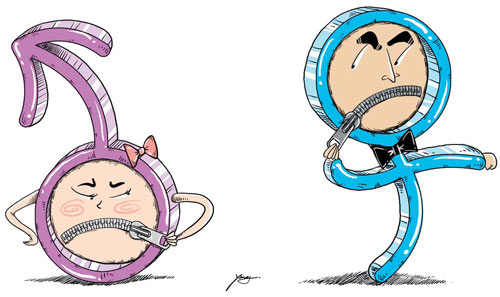The odd couple living abroad
Updated: 2011-02-25 10:17
By Berlin Fang (China Daily European Weekly)
|
 |
Little factors like affection and appreciation are crucial for a marriage to succeed
Before Valentine's Day, a number of media outlets in the United States reported that 40-year-old chemist Li Tianle was suspected of using thallium to poison her husband Wang Xiaoye. Li and Wang graduated from two of China's top universities, Peking University and Tsinghua University, a fact that set the Internet abuzz.
Two persons in a tragedy aren't enough samples for such a generalization, yet they are enough to get people talking about marriages in the invisible community of Chinese living abroad. The case of Li and Wang brought marital issues of overseas Chinese out of family closets. Chinese families living overseas, mine included, often impress people as being, let's put it this way, "interesting". To their extended Chinese families, they are successful people living abroad with houses, cars and two or even three kids who often win prizes thanks to the battle hymns of "tiger moms". To their American neighbors, they are anywhere between eccentric and insane, folks who are more obsessed with vegetables in their backyards than with weeds in their lawns. Few people know what is going on in these people's lives. Much, I would say, just like everybody else.
Being constantly exposed to fellow middle-aged couples, I know that many Chinese couples are riddled with marital problems of one sort or another. I don't need to list them. Tolstoy has summarized it all: all unhappy families are different.
So this is something universal, you may think. But there are still some peculiarities about Chinese couples living abroad. Compared with couples living in China, overseas Chinese couples do not have an easily accessible support system to fall back upon when the goings get tough.
In China, for instance, when a couple gets into a fight, a wife can hui niang jia (go back to her mother's home) to be away from her "evil" husband for a while. Then the mother-in-law or father-in-law steps in to give the trouble-making husband an earful. The husband often apologizes, as the tradition goes, softens up the wife and requests that she come back.
The wife, already regretful of running away from her husband and child, then gladly returns. Things go back to normal. End of story, at least till the next crisis. It's a messy little tradition, but it works.
The tradition has some variations. Sometimes a husband follows in Rip van Winkle's footsteps: leaves home for a while then returns, hoping that the dame would have mellowed down by then. Sometimes the wife goes to a girlfriend's home for a while. In any case, there is a safety valve to let out the extra steam. Things get worse before they get better. And after a number of such iterations, we are too old, too tired, or too philosophical for major conflicts.
For Chinese couples living in the US, however, a minor detail derails the fine tradition. There is a "big pond", also known as the Pacific Ocean, between her house and her mom's home. It is too expensive, too logistically complex and far too risky for a wife to run away to her mother's home! What if the man (or woman) decides not to cooperate to obtain the visa for the wife (or husband) to come back home after playing "truant"?
American couples have their own support mechanisms when things do not work out well. A marriage counselor is one. But I have found that Chinese couples rarely seek such counselors' help to solve their marital problems. "Thou shalt not share family scandals," according to some ancient wisdom, seems to be their motto.
Without mediators such as parents, classmates or counselors, couples in conflict confront each other like two characters in a Harold Pinter play: a room, two people, silence and an unspeakable menace. Things can get ugly from here. What starts as calling names can end up with calling cops.
To make matters worse, Chinese couples are often inarticulate about their feelings. We are as bad as the old Jewish lady Golde in Fiddler on the Roof who has some difficulty answering the question: Do you love me?
It may not be a big deal not to have such affectionate expressions. Let's say actions speak louder. But it certainly is a big deal to have an evasive attitude toward marital problems. American couples, for example, are comfortable with launching a monologue, prefaced by a caution: "Honey, I think we need to talk."
Even after marriage, many Chinese couples resort to guesses about marital issues. Not being outspoken, of course, can prevent some bad things from being said, but it also has the potential of deepening misunderstandings or causing mistrust. It takes so many things for a marriage to succeed - duties to each other's extended families, affection and appreciation, financial obligation, housework and children's education. Open communication is key for many of these pieces to hold a couple together in their joint struggle in a different land.
Living in a foreign country sometimes presents daunting challenges, such as language barriers and maintaining legal resident status, things that local residents do not have to worry about. Issues like these can bond, but I have seen many cases where they divide by adding too much stress that breaks a marriage.
For Chinese going to church in the US, things are different, because in such contexts, people see marriage as something holy. The marital operating system has changed. Ministers, rather than police, can come to the rescue when problems occur.
I doubt that American couples are better role models. Isn't their divorce rate very high? Many Chinese couples do not divorce but they do not enjoy each other's company either. Many problems are like lava, hidden or not noticeable before a volcano erupts. Most of the time, life carries on. And then one day, you hear a depressed husband has jumped from the top of a building. On another day, you read about a wife suspected of using thallium to poison her husband.
So, my dear friends, we all need to talk.
The author is a literary translator, instructional designer living in the US.
E-paper

Factory fever
Despite auto manufacturing bubble scare, car giants gear up expansion of factories.
Dressed for success
Fabric of change
High spirits
Specials

Earthquake Hits Japan
A massive 8.8 magnitude quake hit the northeast coast of Japan on March 11,2011.

NPC & CPPCC sessions
Lawmakers and political advisers gather in Beijing to discuss major issues.

Slide: Japan quake
Devastating earthquake and tsunami left millions without water, electricity, homes or heat.
